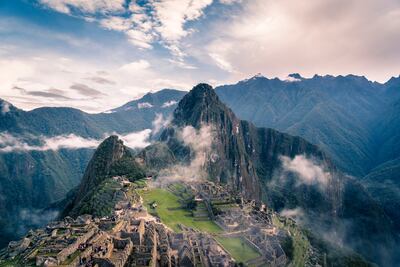Machu Picchu, Peru's most famous tourist attraction, has had its fair share of struggles over the past few months.
After stranded visitors were airlifted out last month and overcrowding resulted in halted ticket sales last summer, now the Incan site has closed "indefinitely" due to ongoing violent protests against the country's new president, it was announced this week.
Tour operators, such as Manuel Sanchez-Palacios, who works for Peru for Less, expect the closure to last for about two weeks, but the aftereffects of political instability to linger much longer.
"Sadly, this will affect tourism for the next few months and all people involved," he tells The National. "This includes everyone from the local artisan who depends on selling handmade goods to tourists, to the tour guides, and then larger agencies like us. Anyone who operates in Peru will feel the effects of this, especially after the temporary closure of Machu Picchu."
Protesters have been demanding the resignation of Peru's President Dina Boluarte, since she was sworn in last month after serving as vice president. Since then, 46 people have died and the government has imposed a state of emergency in certain areas of the country.
They want her predecessor, the ousted left-wing Pedro Castillo, to be released from jail where he's facing charges of rebellion and conspiracy.
"As a country, we are hurting socially and politically, and seeing the image of Peru being damaged as well is painful," says Sanchez-Palacios. "I know this is a dream destination for many travellers, and as a Peruvian, I only want to share the beauty of experiencing my country."

Sanchez-Palacios advises tourists who are planning to travel to Peru, or visit Machu Picchu, to hold on to their tickets and travel dates.
"If you booked with an agency, ask for their postponement policy, and if the worst comes to worst, you can always postpone or transfer your travel credit," he advises. "If you didn't book with an agency, follow the recommendations of who emitted your tickets."
Right now, the company he works for, which offers custom tours and travel packages at affordable prices, is experiencing a deluge of cancellations and postponements, but they're offering customers solutions such as lower fees, extended or transferable travel credit and alternative itineraries with other brands in the group.
Peru has been through worse, he says, and Machu Picchu remains an "extremely important" site. The citadel was built in the 15th century as a religious sanctuary for the Incas at an altitude of 2,490 metres. In 2018, it attracted 1.5 million visitors. Last summer, capacity was at 4,044 visitors a day, increasing steadily since the Unesco World Heritage attraction reopened in October 2020. The UN has described it as “probably the most amazing urban creation of the Inca Empire at its height".
"Tourism has always rebounded in Peru no matter the circumstances; we've been through much worse, including the pandemic, so I would still hold on to current travel dates unless they are within the next two weeks," Sanchez-Palacios says.
He recalls a situation in 2010 when Machu Picchu closed for two months due to a heavy mudslide that nearly destroyed Aguas Calientes. "We spent months suffering the consequences," he says.
The most recent closure is mainly due to railway damage, which left hundreds of tourists and civilians stranded for hours as protests raged.
"Luckily, the damage to the rails is not as significant as it was in 2010, and we hope that trains will resume soon after Machu Picchu reopens," he says.
Ultimately, he is confident the unrest will settle soon. "And once it does, I hope travellers will visit without hesitation," he adds.
"I would ask all travellers considering travelling here to please keep Peru in their hearts."









